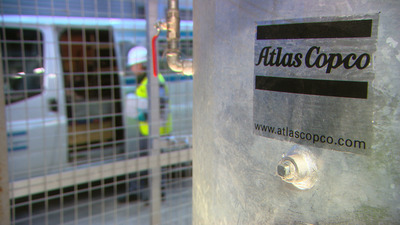Atlas Copco helps turn Nottingham's waste into energy
Tuesday, 21 January, 2014
UK waste management company FCC Environment is using the latest energy-efficient compressor and filtration solutions from Atlas Copco to help turn waste into energy at its Nottingham waste processing site.
The energy from the company’s commercial and domestic waste processing facility in Nottingham produces heat and steam to generate power without using fossil fuels. Its Eastcroft plant generates steam used by many public buildings in Nottingham and keeps 5000 families warm while keeping the climate a little cooler. Since the facility opened 39 years ago, it has reduced the amount of Nottinghamshire’s waste going to landfill sites by 5 million tonnes.

The facility needs quality compressed air for a number of process applications: from emission monitoring equipment to the pulsing of filtration bags employed in the flue gas treatment stages of the operation. Air quality is extremely important, since any contaminants in the air supply would affect the instrumentation that is vital to flue gas monitoring and risk non-compliance with the company’s environmental licence stipulations.
This requirement for high quality standards is the principal reason FCC turned to Atlas Copco to meet its compressed air needs. Equipment installed at the site includes two GA 90 screw compressors - one fixed-speed and the other a VSD machine (capable of matching output to user demand for optimum energy savings). The system was augmented with three vertical air receivers and, to ensure first-class dry air at the point of use, three BD desiccant dryers with a guaranteed dew point of -70°C. These were then fitted and connected to Atlas Copco’s latest in particulate and coalescent filters. Environmental protection was also ensured with the installation’s EWD condensate management system that prevents any possible drainage contamination.
When the Atlas Copco team surveyed the installation site, they found a great deal of external pipework between the location of the compressors and the various points of use throughout the production facility, so it was essential that pressure drop within the air net had to be kept to a minimum. FCC was one of the first to have Atlas Copco’s latest filter range units installed. The design of the innovative filters means a pressure drop of only half of that associated with conventional coalescing or particulate filters is incurred. This translates into significant energy savings.
Alan Burkill, Atlas Copco Sales Engineer and the principal liaison on the project, outlined the core benefits to be derived from the compressed air system. “When we sat down to discuss potential requirements, life cycle costs and energy efficiency was at the forefront of everyone’s mind. Our proposal was a solution that delivered the lowest life cycle cost to our customer, and energy-efficient filtration was an integral and indispensable part of the installation.”
According to Philip Eyre, FCC Environment’s maintenance manager, the whole system is a perfect fit with FCC’s ethos. “I have known Atlas Copco for over 23 years and have always had a good quality service from them in all respects. The quality of their products definitely fits with what FFC requires in this facility.”
Heat recovery could save money and the environment
Up to 96% of the drive energy supplied to a compressor is available for reuse — this is...
Dirty dancing across a new energy landscape
The real-time balancing of electricity generation (supply) and demand is like a dynamic dance and...
Digitising Australia's buildings is key to tackling net zero
Businesses around the world are continuing to focus on net zero, and building construction and...











